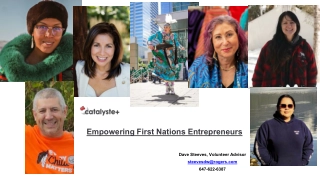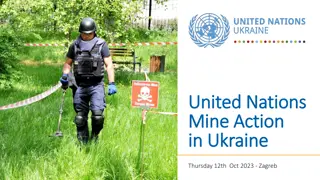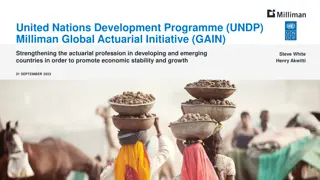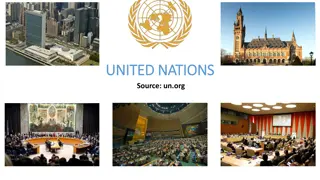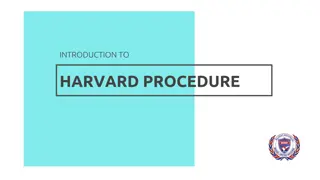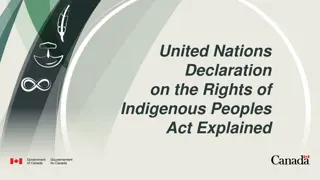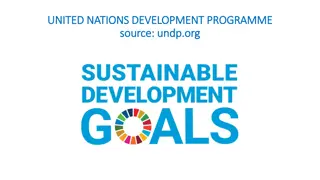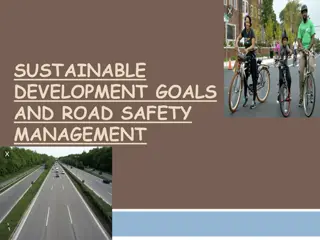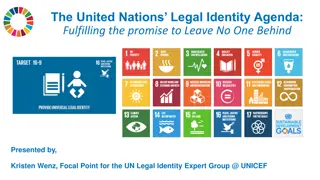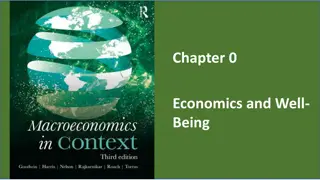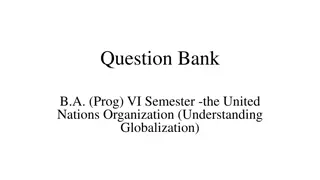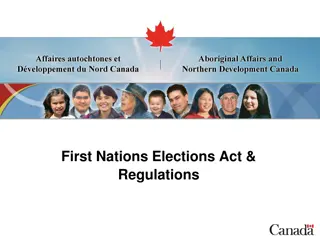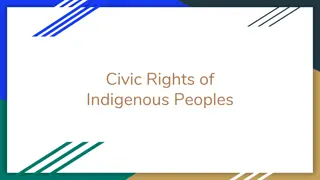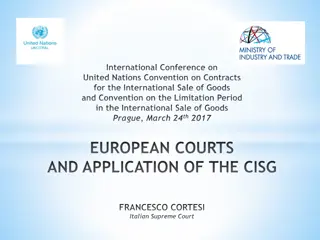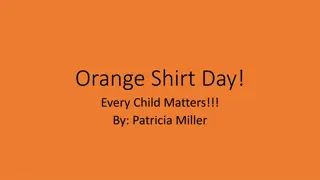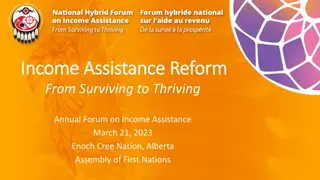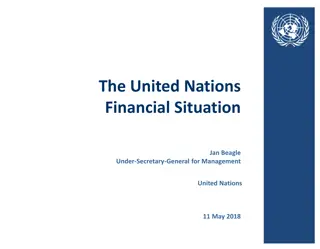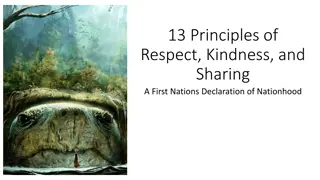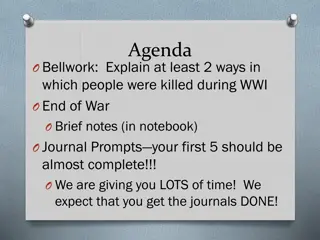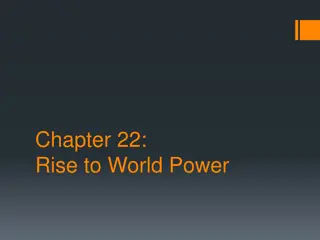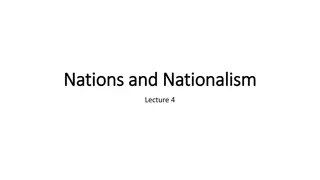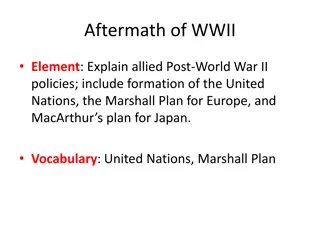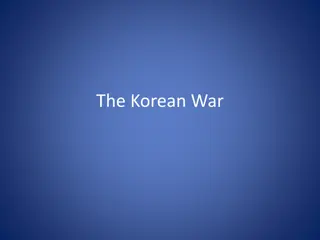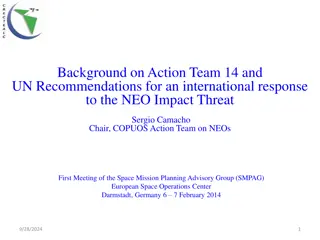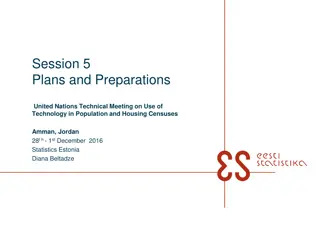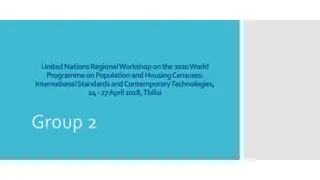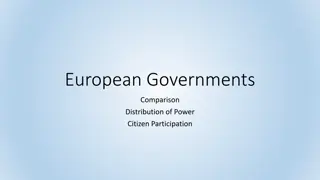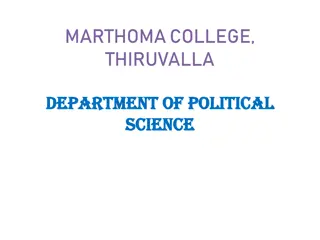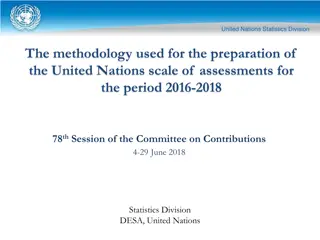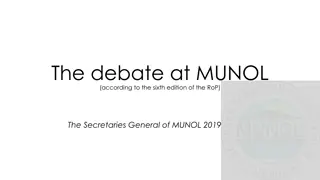Empowering First Nations Entrepreneurs
Empowering First Nations Entrepreneurs is a program by OFNEDA, a Canadian economic development organization, providing guidance and support to Indigenous entrepreneurs. The initiative matches Indigenous partners with experienced volunteer advisors to enhance capacity-building and facilitate communit
0 views • 28 slides
United Nations Development Programme - Financial Overview 2022
This document provides a detailed financial overview of the United Nations Development Programme's multi-country Western Pacific HIV, TB, and Malaria Program for the year 2022. It includes budget allocations, expenditures, grant information, sub-recipient performance, and reprogramming activities. T
1 views • 10 slides
Addressing Ukraine's Mine Action Challenges - United Nations Efforts
The United Nations is actively involved in mine action efforts in Ukraine, where a large portion of territory has been affected by war and potential landmine contamination. The need for outcome-driven demining, risk management, and innovative solutions are highlighted to effectively address the dual
6 views • 11 slides
United Nations Survey on Crime Trends and Operations of Criminal Justice Systems
The United Nations Survey on Crime Trends and Operations of Criminal Justice Systems (UN-CTS) focuses on harmonizing data collection, identifying crime patterns, improving monitoring of the criminal justice system, and enhancing international comparability of crime statistics. It was mandated by the
4 views • 18 slides
Milliman Global Actuarial Initiative (GAIN)
The United Nations Development Programme (UNDP) and Milliman Global Actuarial Initiative (GAIN) are working together to enhance the actuarial profession in developing nations, fostering economic stability, and growth. The initiative aims to promote risk protection mechanisms through insurance contri
5 views • 27 slides
United Nations Legal Identity Agenda and Civil Registration Guidelines
The United Nations Legal Identity Agenda aims to ensure legal recognition for all individuals through civil registration systems. This initiative, aligned with the 2030 Agenda for Sustainable Development, emphasizes birth registration and legal identity as fundamental rights. The agenda encompasses
2 views • 10 slides
Overview of the United Nations: Mission, Membership, and Impact
The United Nations, established in 1945 with headquarters in New York City, is an international organization comprising 193 Member States. Guided by its founding Charter, the UN addresses various global challenges such as peace, climate change, human rights, and more. Through its bodies and committe
0 views • 21 slides
Harvard Procedure Guidelines and Rules for Model United Nations
In this guide, you will explore the rules and procedures specific to the Harvard Procedure in Model United Nations. It covers general rules, guidelines on resolutions and voting, language requirements, courtesy expectations, rules of procedure, motions, points of order, and parliamentary inquiries.
6 views • 20 slides
Understanding the United Nations Declaration on the Rights of Indigenous Peoples Act
The United Nations Declaration on the Rights of Indigenous Peoples Act, effective from June 21, 2021, aims to protect and promote Indigenous rights, including self-determination and equality. Key elements include the preamble emphasizing reconciliation, interpretive elements in Section 2, and the de
2 views • 13 slides
United Nations Sustainable Development Goals (SDGs) Overview
The United Nations Sustainable Development Goals (SDGs), also known as the Global Goals, aim to end poverty, hunger, and various inequalities by 2030. There are 17 interconnected SDGs covering key aspects like poverty eradication, gender equality, climate action, and sustainable development. These g
1 views • 24 slides
Understanding Sustainable Development Goals and Road Safety Management
The Sustainable Development Goals (SDGs) are set by the United Nations to address various global challenges such as poverty, hunger, education, and gender equality. This initiative aims to promote sustainable development in developing nations, with a focus on Africa. Road safety management is also c
3 views • 19 slides
Understanding the League of Nations: Good Idea or Not?
The League of Nations, established after WWI, aimed to promote peace through collective security and cooperation among nations. It faced challenges due to limited powers and the attitudes of key member countries. Despite its intentions, the League ultimately struggled to prevent future conflicts.
0 views • 9 slides
United Nations Legal Identity Agenda: Achieving SDG 16.9
The United Nations Legal Identity Expert Group (LIEG) aims to close the global legal identity gap by over 300 million within four years. The group focuses on implementing a life-cycle approach to legal identity, starting from birth, to ensure no one is left behind. The structure and strategy of LIEG
2 views • 10 slides
First Nations Attack on Fort Michilimackinac 1763: Causes, Tribes, and Aftermath
The First Nations' attack on Fort Michilimackinac in 1763 was triggered by British actions that disrupted their way of life. The Ojibwe, Odawa, Potawatomi, Ottawas, and Hurons were involved in the attack, led by Chief Pontiac. Following the attack, the British did not rebuild the fort but establishe
1 views • 7 slides
International Economic Indicators Comparison
The data presented includes GDP per capita rankings for various countries in 2015, showcasing the economic status of nations like Qatar, Norway, and the United States. It also illustrates the growth in GDP per capita from 2006 to 2015, with countries like China and India showing significant progress
2 views • 21 slides
United Nations Sustainable Development Goals Overview
The United Nations Sustainable Development Goals (SDGs) aim to address global challenges such as poverty, hunger, health, education, and gender equality. Each SDG has specific targets and related human rights, focusing on improving the well-being of people worldwide. The goals include eradicating po
0 views • 17 slides
Exploring the United Nations: Formation, Role, and Challenges
Delve into the history, principles, and evolving role of the United Nations, analyzing its impact on global issues such as peacekeeping, human rights, and climate change. Assess the organization's achievements, limitations, and proposed reforms, highlighting its significance in today's era of global
0 views • 8 slides
Enhancing First Nations Governance through the First Nations Elections Act
The First Nations Elections Act (FNEA), developed between 2008 and 2011, addresses weaknesses in the Indian Act election system by offering an optional framework for First Nations governance. Key components include four-year terms, common election days, court appeals, defined offenses, and opting ou
0 views • 14 slides
Native American Voting Rights and Indigenous Governance in the United States
Native American voting rights in the United States have a complex history, with Native peoples gaining the right to vote gradually over time. Despite legal allowances, barriers such as nontraditional addresses, voter registration obstacles, and ID laws still hinder their voting participation. The Na
2 views • 11 slides
International Conference on United Nations Convention on Contracts & CISG Application
This content discusses the application of the United Nations Convention on Contracts for the International Sale of Goods (CISG), the interpretation of CISG in international trade, and the significance of CISG prevailing over Private International Law (PIL) rules in transnational litigation. It empha
1 views • 21 slides
Understanding Orange Shirt Day & First Nations Heritage
Lend your support to Orange Shirt Day as a tribute to First Nations children who suffered in residential schools. Learn about the resilient spirit of First Nations families and their rich cultural traditions.
0 views • 13 slides
Reflections on Dear Uncle Sam: A Tale of Two Nations
In a heartfelt series of letters, individuals share their thoughts on the relationship between the United States and Mexico, highlighting mutual respect, cultural richness, and the pursuit of dreams. The letters convey hope for a harmonious future and celebrate the unique identities and strengths of
0 views • 5 slides
Reforming Income Assistance for First Nations: Building Towards Self-Determination
Income Assistance Reform for First Nations aims to address the longstanding gaps in the current program, focusing on enhancing self-determination and support for thriving communities. The initiative involves a co-development process led by First Nations to make the program more responsive to their u
0 views • 9 slides
United Nations Financial Situation Analysis
This analysis provides insights into the financial status of the United Nations as of various dates in 2016, 2017, and 2018. It includes data on assessments, payments, outstanding dues, cash on hand, and the number of member states paying in full. Charts visualize the regular budget assessment statu
0 views • 24 slides
Principles of Respect, Kindness, and Sharing: A First Nations Declaration
In this declaration, the author emphasizes the responsibility of First Nations as caretakers of their ancestral lands. It discusses the historical exclusion of First Peoples in the formation of Canada and calls for the recognition and preservation of Indigenous rights and sovereignty. The text highl
0 views • 16 slides
Addressing Higher Education Challenges in the United States
The United States faces challenges in higher education with a focus on increasing completion rates and closing the skills gap. Initiatives such as the "15 to Finish" campaign aim to enhance student achievement and enrollment intensity. Data reveals the U.S. ranking 14th among developed nations for e
0 views • 31 slides
The End of World War I and the Treaty of Versailles
The end of World War I marked by the collapse of Germany's allies, the signing of the Treaty of Versailles, and the formation of the League of Nations. The aftermath of the war led to significant political and social challenges in Europe, with the U.S. proposing the Fourteen Points for peace. Howeve
0 views • 5 slides
United States Expansionism in the Late 1800s
In the late 1800s, the United States, under the policy of expansionism, extended its influence to other regions such as Japan and Alaska. This era marked a period of imperialism where the US sought to gain control over weaker nations and build an empire, leading to the purchase of Alaska and closer
0 views • 28 slides
Understanding Nations, Nationalism, and Their Emergence: A Comprehensive Overview
Explore the concept of nationhood, the evolution of nationalism, and the intricate relationship between cultural and political identities. Delve into the emergence of nations, the definition of a nation, and the complexities of cultural nations. Uncover historical examples, such as the Polish-Lithua
0 views • 15 slides
Post-World War II Policies: United Nations, Marshall Plan, and MacArthur's Plan
Following the aftermath of World War II, allied nations implemented various policies such as the formation of the United Nations, the Marshall Plan for Europe, and MacArthur's plan for Japan. Post-war Europe faced severe devastation, leading to the need for international peacekeeping efforts and eco
0 views • 38 slides
The Korean War: A Conflict Dividing Nations
At the conclusion of World War II, Korea was temporarily divided into Soviet-occupied North and American-occupied South zones. The Korean War broke out in 1950 when North Korean troops crossed the 38th parallel. United Nations forces intervened, leading to a stalemate with Chinese involvement. Gener
0 views • 5 slides
The Divine Narrative: Nations, Jubilee, and History - Reflections on God’s Sovereignty
Explore the intertwining threads of biblical prophecies, the significance of Jubilee cycles in Israel, and historical milestones, all illustrating God's divine plan for nations. From the ancient testimonies of Israel to modern-day reflections of Jubilee observances, witness the grand tapestry of God
0 views • 15 slides
International Response to NEO Impact Threat: UN Recommendations
Recent United Nations General Assembly agreements pave the way for an international response to the threat of near-Earth object impacts. Originating from UNISPACE III in 1999, the establishment of the Action Team on NEOs (AT-14) has led to significant recommendations adopted by the United Nations. C
0 views • 26 slides
United Nations Technical Meeting on Use of Technology in Population and Housing Censuses
Session 5 Plans and Preparations for the United Nations Technical Meeting on Use of Technology in Population and Housing Censuses held in Amman, Jordan from 28th November to 1st December 2016. The session covered topics such as timetable of Population and Housing Census 2011, training programs for s
0 views • 58 slides
Insights from United Nations Regional Workshop on Population and Housing Censuses
Highlights from the United Nations Regional Workshop on the 2020 World Programme on Population and Housing Censuses in Tbilisi, covering topics such as disability data collection challenges, deriving population with usual residence, and measuring SDGs through census data.
0 views • 20 slides
Understanding Model UN: Your Voice, Your Story
Model United Nations (MUN) is an educational simulation that aims to teach students about global affairs, diplomacy, and current events. Participants take on roles as diplomats representing different countries to address international issues, debate, and find solutions collaboratively. Various commi
0 views • 14 slides
European Governments & Citizen Participation Overview
This content provides a comparison of European governments with a focus on the distribution of power and citizen participation. It outlines the characteristics of parliamentary democracy, presidential democracy, and different government types in countries like Russia, Germany, and the United Kingdom
0 views • 5 slides
Collective Security in International Relations: A Comprehensive Overview
Collective security is a crucial concept in international politics, aimed at maintaining peace and preventing aggression among nations. This system calls for joint action to counter threats to global peace, originating post-World War I with the League of Nations. Based on four key principles, nation
0 views • 8 slides
Overview of United Nations' Scale of Assessments Methodology for 2016-2018 Period
The presentation provides an in-depth look into the methodology used by the United Nations to calculate the scale of assessments for Member States' contributions to the regular budget. It discusses key components such as national income, conversion rates, base periods, debt burden adjustments, relie
0 views • 45 slides
Understanding MUNOL: Your Guide to Model United Nations Debates
Get a comprehensive overview of Model United Nations debates (MUNOL) including key participants, resolution structure, debate processes, points and motions, as well as practical tips on how to effectively participate in these simulations. Explore the roles of delegates, chairs, and ad-staff, learn a
0 views • 9 slides
